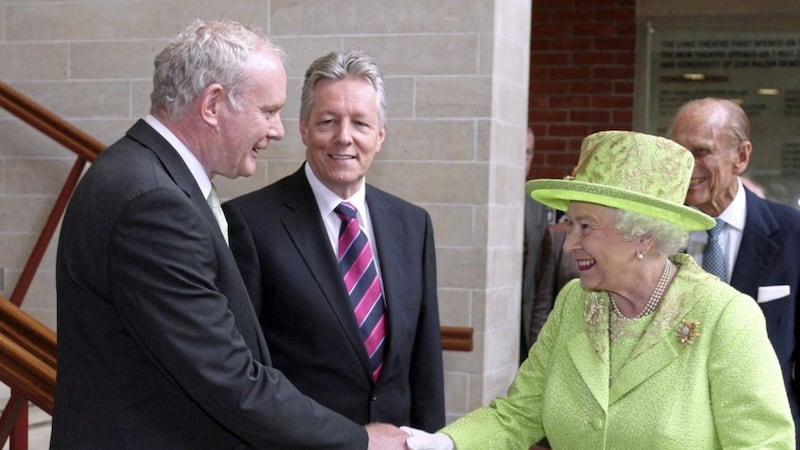Our society stands in liminal space, a threshold between past and future, a passage tomb shrouded in the fog of a dirty war.
Unhealed hurts and unspoken truths are walking uneasily beside deep-seated hopes and spring-welled souls straining to build new tomorrows.
This is our pathway, our destiny for today, somewhere between fiercely held memories and hope-filled dreams. There is no starting point or finishing post. There is no moment of absolute truth or never-ending lie. This is the pathway of history. Of every ruptured land. Of every wrecked soul. Our journey is not unique.
The legacy of our brutal conflict will continue to be venerated (or generated) around cultures of commemoration that will always remain imperfect and incomplete; though often with the deepest poignancy, like Bloody Sunday or Teebane recently.
Some hierarchies will continue to be protected and promoted in the dialogue around truth recovery. Many voices and truths will never even be heard in the corporate lobbies of the powerful, their unwelcome narratives sidelined in life just as their loved ones were silenced in death. (A revealing act of modern-day discrimination.)
The stepping stones towards an unwritten future will ultimately rely on the attitudes and agendas we bring to our relationships, and those of younger generations – social, political, professional, personal. A law cannot deliver truth any more that it can compel reconciliation or impose integrity. People must make choices.
Reconciliation is mostly what we make of ourselves. It’s about how we face up to ourselves more so than the ‘other’.
When reconciliation genuinely begins, the transformation is like a rip tide, largely unseen but increasingly visible in shifting the sands of engagement and understanding towards interdependence. But it is not just about people as individuals. It’s about communities, groups, agencies, institutions, governments, states.
Facing forward, we need to develop a parallel process as our society continues to grapple with ‘the legacy of conflict’ - that carefully neutral label of polite banality that we use to avoid describing the sheer bloody, heartbreaking awfulness of brutality that flowed from our actions, or acquiescence, or avoidance.
This parallel process needs politics to recognise that Ireland-UK relationships matter very deeply – notwithstanding historic disagreement over conflict or colonialism. Few generations have had clean hands on any side, and fewer still have been purer than snow in all of their motivations and machinations.
At some point, as slowly dropped in the 1980s, 1990s, and 2000s, we need public leadership to nurture a new relationship of respect and rapprochement between the island of Ireland and the island of Britain – of a calibre that may never have existed before now.
Our common failure to consider with maturity, with dignity, with forethought, the critical importance of this relationship is reckless and stupid. It hampers our pathway between the past and the future. Not all Ireland is perfect. Not all Albion is perfidious.
Two globally significant factors will be critical in framing Ireland-UK relationships across the coming decade on both islands.
One, Dublin has now become the senior diplomatic partner with an unprecedented level of Irish ‘soft-power’ internationally. Two, London remains the senior security partner with resources, abilities and insight vastly beyond Ireland’s current capacity. These mean that both governments have something to gain alongside something to give. Both islands can benefit from jointly facing the tidal megatrends of security, economic, technological and political revolution over the next twenty years.
Relationships need recalibrated between both governments - more than ever partnering as equals, respecting both the UK’s direction alongside the autonomy of Ireland's military neutrality and its EU membership.
Think beyond Brexit about myriad examples like the joint impact of increasing Russian naval interference in Irish coastal waters; cybersecurity threats that transcend borders; the dual opportunities of all-island economic and tourism promotion; the UK’s need to rebuild its battered international reputation; the glaring lack of any Irish national security strategy by Dublin; collaborations of creativity to address common issues of poverty and inequality; and above all, the ongoing protection and implementation of the Good Friday Agreement – its ethos, strands, institutions and promises - “in all its parts”.
The predictable future creates largely unaddressed joint challenges for both main islands of the Irish Sea, including ongoing constitutional evolution. The Good Friday Agreement - and its priorities of rights-based reconciliation and mutual respect, approved through self-determination – can begin to address those challenges.
Therein lies the signpost for the pathway ahead; walking in parallel beside our yesterdays and our tomorrows; reinvigorating relationships and bonds of civic culture, politics and economy; reaching out with open hands beyond the hurts and horrors of history, beyond today’s cul-de-sacs of cynicism. Reaching out, once again, with hope.








